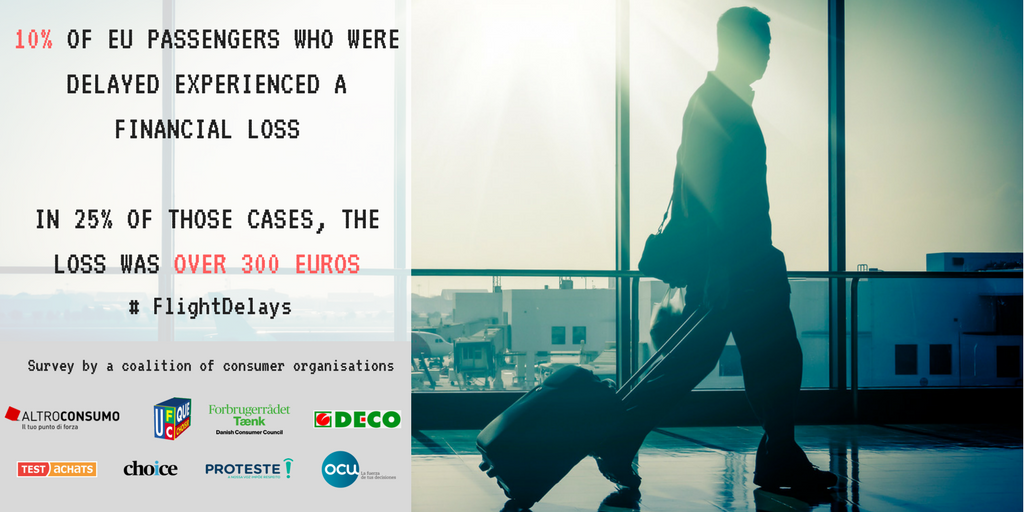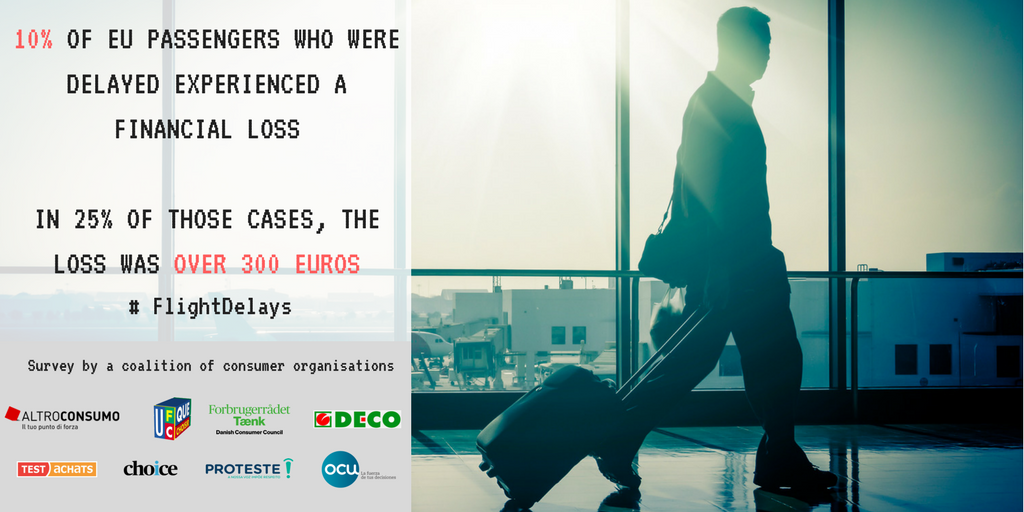We don’t know if readers are among the 25% air passengers who have experienced flight delays, but they very well could be because that is a shockingly high percentage. We have released an international survey together with 7 other consumer organisations to assess the satisfaction of airline companies of more than 11,000 people in Australia, Belgium, Brazil, Denmark, France, Italy, Portugal and Spain.
Travelling away from home, and being obliged to wait for hours without clear information on whether or when you are going to board, isn’t enjoyable. You feel deprived not only of your consumer rights but of the freedom of movement. It’s frustrating for consumers’ organizations as well to know that about 75% of people did not get the reimbursement they were entitled to. That’s why we need change.
 Altroconsumo joined forces together with other BEUC and Consumers International members and is asking for a better enforcement of EU regulation 261/2004 and to oblige airlines to better inform and reimburse consumers. 10% of those who had delays experienced a financial loss and despite this fact that in one quarter of the cases this amount was 300 euros or more, they often they did not claim their rights.
Altroconsumo joined forces together with other BEUC and Consumers International members and is asking for a better enforcement of EU regulation 261/2004 and to oblige airlines to better inform and reimburse consumers. 10% of those who had delays experienced a financial loss and despite this fact that in one quarter of the cases this amount was 300 euros or more, they often they did not claim their rights.
The right to receive compensation when experiencing a delay of more than three hours or a cancellation was respected in only one case out of four. In around one quarter of cases, no explanations were given, both for delays and cancellations.
 But then there is another reason that airlines frequently put forward: what is called ‘extraordinary circumstances’. Compensation is not due if the carrier can prove that the cancellation or the delay is caused by circumstances which could not have been avoided even if all reasonable measures had been taken. Examples are air traffic management decisions, political instability, adverse weather conditions and security risks. However most technical problems are not considered to be extraordinary circumstances.
But then there is another reason that airlines frequently put forward: what is called ‘extraordinary circumstances’. Compensation is not due if the carrier can prove that the cancellation or the delay is caused by circumstances which could not have been avoided even if all reasonable measures had been taken. Examples are air traffic management decisions, political instability, adverse weather conditions and security risks. However most technical problems are not considered to be extraordinary circumstances.
The regulation has been interpreted in various ways, due to grey zones and gaps in the current legislation, and the variations in the enforcement between Member States. On many occasions, the Court of Justice of the European Union has been requested by national courts to clarify certain provisions, including key aspects of the regulation.
This survey proves it again: it is often difficult for passengers to have their individual rights respected. That is why the EU made interpretative guidelines so that the current rules can be more effectively and more consistently enforced.
The survey took place during September and October 2016. The data from consumers was collected through two versions of the same questionnaire, a paper questionnaire in September 2016 and the same questionnaire online over October 2016. Only people who had taken a plane trip in the 12 previous months were asked to fill in the questionnaire.
Table 1: incidence of delays for airlines surveyed
(This table provides the number and percentage of delays that consumers reported for the airline they were travelling with)
| Delay (at least 15 minutes) | Delay (at least 60 minutes) | average delay
(minutes) |
Number | |||
| % NO | % YES | % NO | % YES | |||
| KLM | 88,6% | 11,4% | 90,0% | 10,0% | 191 | 290 |
| Emirates | 88,5% | 11,5% | 92,7% | 7,3% | 162 | 339 |
| Qatar Airways | 88,4% | 11,6% | not available | 264 | 138 | |
| Singapore Airlines | 87,5% | 12,5% | not available | 177 | 120 | |
| Norwegian | 84,7% | 15,3% | not available | 203 | 137 | |
| Wizz Air | 83,7% | 16,3% | not available | 239 | 104 | |
| Air Canada | 81,7% | 18,3% | not available | 250 | 120 | |
| Lufthansa | 81,1% | 18,9% | 85,8% | 14,2% | 250 | 599 |
| Qantas | 81,0% | 19,0% | 84,6% | 15,4% | 142 | 248 |
| Ryanair | 78,7% | 21,3% | 85,6% | 14,4% | 128 | 2488 |
| United Airlines | 78,6% | 21,4% | 82,2% | 17,8% | 228 | 131 |
| TUIFly | 78,4% | 21,6% | 82,2% | 17,8% | 234 | 537 |
| Transavia.com | 78,2% | 21,8% | 85,1% | 14,9% | 180 | 349 |
| Delta Air Lines | 78,1% | 21,9% | 79,8% | 20,2% | 300 | 151 |
| Iberia | 77,8% | 22,2% | 84,5% | 16,5% | 150 | 472 |
| Avianca | 77,4% | 22,6% | 82,9% | 17,1% | 162 | 372 |
| Turkish Airlines | 76,9% | 23,1% | 79,3% | 20,7% | 195 | 195 |
| Air France | 76,0% | 24,0% | 82,6% | 17,4% | 222 | 1359 |
| Azul Brazilian | 75,5% | 24,5% | 80,4% | 19,6% | 194 | 644 |
| easyJet | 75,4% | 24,6% | 82,9% | 17,1% | 127 | 1399 |
| Brussels Airlines | 74,7% | 25,3% | 81,3% | 18,7% | 168 | 667 |
| Virgin Australia | 74,4% | 25,6% | not available | 110 | 117 | |
| Thomas Cook Airlines | 74,1% | 25,9% | 80,3% | 19,7% | 340 | 166 |
| TAP Portugal | 74,0% | 26,0% | 81,3% | 18,7% | 145 | 1240 |
| British Airways | 74,0% | 26,0% | 78,9% | 21,1% | 200 | 246 |
| HOP! | 71,8% | 28,2% | 78,6% | 21,4% | 136 | 181 |
| American Airlines | 70,1% | 29,9% | 73,1% | 26,9% | 252 | 177 |
| Volotea | 66,8% | 33,2% | 71,0% | 29,0% | 188 | 190 |
| Alitalia | 66,8% | 33,2% | 77,5% | 22,5% | 205 | 575 |
| SATA | 65,3% | 34,7% | 75,9% | 24,1% | 193 | 190 |
| LATAM Airlines | 64,6% | 35,4% | 74,7% | 25,3% | 155 | 1056 |
| Air Europa | 64,4% | 35,6% | 68,9% | 31,1% | 183 | 236 |
| Vueling | 63,0% | 37,0% | 67,3% | 32,7% | 242 | 652 |
| Jetstar | 62,8% | 37,2% | not available | 238 | 113 | |
| GOL Linhas Aereas | 61,5% | 38,5% | 72,8% | 27,2% | 129 | 1035 |
| TOTAL | 74,9% | 25,1% | 81,0% | 19,0% | 180 | 20239 |
The right to free food & drink when experiencing a delay of more than 2 hours or a cancellation was respected in less than half of cases.
Table 2: the right to care
(This table provides the number of cases where consumers were entitled to care because of a delay of more than 2 hours which was subject to EU regulation and the percentage of cases where the airline took action)
| Flights with delays for which EU passenger rights apply | Delays of > 2 hours | |
| Number | % | |
| Written info on passengers’ rights | 108 | 14,6% |
| Food & drink | 345 | 45,9% |
| Free call | 40 | 5,5% |
| NONE of the above | 377 | 51,3% |
In case of luggage problems (delay, damage or complete loss) a refund has been given in 15% of the cases. That means EU legislation was not applied in 85% of cases and customers reported they were not being reimbursed. A common worldwide legislation obliging companies to refund passengers when these situations occur does not exist. We are working together with Consumers International to revise the Montreal Convention.
Table 3: incidence of luggage problems
(This table provides information about the frequency and percentage of luggage problems for the flights taken by consumers, subject to EU regulation, that were surveyed)
| Number | ALL % | %* | |
| None | 12223 | 82,7% | 91,0% |
| Being delayed | 685 | 4,6% | 5,1% |
| Being damaged | 127 | 0,9% | 0,9% |
| Being delayed and damaged | 373 | 2,5% | 2,8% |
| Being stolen/lost | 27 | 0,2% | 0,2% |
| I didn’t board any luggage | 1306 | 8,8% | – |
| Can’t remember | 30 | 0,2% | – |
| Total | 14771 | 100,0% | 100,0% |
| I had a problem with luggage | 1212 | 8,1% | 9,0% |
*excluding I didn’t board any luggage and Can’t remember.
In the end, if satisfaction with airline companies is mainly given by value for money, punctuality and on board staff, I wonder why airlines companies simply don’t improve their complaint handling schemes as this could be one of the most important factors for increasing the loyalty of their customers and rewarding them for it. Consumer organisations’ helplines and websites play a key role in this regard as partners in providing information and solving disputes, but also in offering tools to help consumers to compare airlines and make their choice. The starting point is however the willingness to solve problems, not disregarding or hiding consumer rights.


